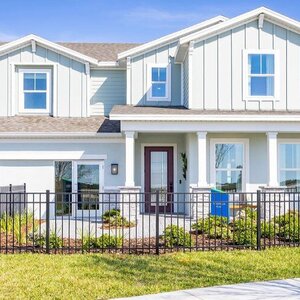Residential Real Estate News

New Home Sales in the U.S. Jump in November
Residential News » Jacksonville Edition | By Michael Gerrity | December 27, 2021 9:06 AM ET
Consumer Demand Still Remains High
According to the U.S. Department of Housing and Urban Development and the U.S. Census Bureau, new home sales posted a solid gain last month, driven by strong buyer demand, low existing home inventory and buyers' anticipation of future higher mortgage rates.
Sales of newly built, single-family homes in November rose 12.4% to a 744,000 seasonally adjusted annual rate from a downwardly revised reading in October, 2021. New home sales were down 14% compared to a year ago.
"Our members are seeing strong buyer traffic as continued low mortgage rates are helping fuel sales," said Chuck Fowke, chairman of the National Association of Home Builders. "However, builders are still grappling with major supply chain issues and soaring materials costs, which are causing construction delays."
"Despite the increase in sales, housing affordability remains a major concern," said Danushka Nanyakkara-Skillington, NAHB Assistant Vice President of Forecasting and Analysis. "With building material pricing, the challenge for builders in 2022 will be to deal with higher input costs while making sure home prices remain within reach for American home buyers."
A new home sale occurs when a sales contract is signed or a deposit is accepted. The home can be in any stage of construction: not yet started, under construction or completed. In addition to adjusting for seasonal effects, the November reading of 744,000 units is the number of homes that would sell if this pace continued for the next 12 months.
Inventory remains steady at a 6.5-months' supply, with 402,000 new single-family homes for sale, compared to 290,000 in November 2020.
The median sales price continued to rise to $416,900 from the $408,700 median sales price posted in October, and rose 18.8% on a year-over-year basis, due to higher development costs, including materials.
Regionally, on a year-to-date basis, new home sales fell in all four regions, down 1.3% in the Northeast, 5.3% in the Midwest, 4.5 % in the South, and 12.5% in the West.
Sign Up Free | The WPJ Weekly Newsletter
Relevant real estate news.
Actionable market intelligence.
Right to your inbox every week.
Real Estate Listings Showcase
Related News Stories
Residential Real Estate Headlines
- Las Vegas Area Home Prices Uptick 4.3 Percent Annually in March
- Single-Family Rent Growth in U.S. Trends Upward in 2025
- U.S. Mortgage Rates Tick Down Post Trump Tariffs Commencement
- President Trump's 'Liberation Day' Tariffs Potential Impact on the U.S. Housing and Mortgage Markets
- Baby Boomers Biggest Cohort of U.S. Home Buyers in 2025 as Millennials Decline
- U.S. Monthly Housing Payments Hit Record High in 2025
- U.S. Pending Home Sales Uptick in February
- Global Prime Residential Rent Slowdown Continued in Late 2024
- Ireland Home Price Inflation Hits 8 Year High in Early 2025
- Existing Home Sales in America Uptick in February
- Great Miami Area Residential Sales Decline 15 Percent Annually in February
- Mortgage Rates Uptick in Mid-March, Ending 9-Week Decline in U.S.
- World Property Ventures Builds the Future of Real Estate with New Funding Round
- U.S. Builder Sentiment Declines Amid Economic Uncertainty and Rising Costs
- Black Homeownership Rates in U.S. Enjoy Largest Annual Increase of All Racial Groups
- Wealthy Renters Are Taking Over More of the U.S. Rental Market
- If U.S. Congress Does Not Extend NFIP Soon, Thousands of Daily Home Closings Impacted
- U.S. Mortgage Applications Spike 11 Percent in Early March
- Greater Palm Beach Area Residential Sales Rise in Early 2025
- New Apartments in U.S. Are Leasing at Slowest Pace on Record
- U.S. Mortgage Rates Drop to 4 Month Low in March
- Overall U.S. Mortgage Delinquency Rates Dip in December
- New Tariffs on Canada, Mexico to Impact U.S. Homebuilder Input Costs
- Monaco's Property Market: A Tale of Two Cities
- U.S. Home Purchase Cancellations Surge, 1 in 7 Sales Getting Canceled
- U.S. Pending Home Sales Hit Historic Low in Early 2025
- Greater Miami Area Residential Sales Dip in January
- Governor DeSantis Supports Ending Property Taxes in Florida
- WPV Aims to Become the Berkshire Hathaway of Real Estate Tech
- U.S. Home Sales Slump Continues in January
- Average Americans Spend 38 Percent of Monthly Income on Mortgage Payments
- Switzerland's Safe-Haven Appeal Grows with World's Wealthy Homebuyers
- U.S. Builder Confidence Rapidly Declines in February
- Las Vegas Home Sales Rise 6.7 Percent Annually in January, Condo Sales Dip
- Homebuyer Demand in America Drops to 5-Year Low in Early 2025
- Ownership More Affordable Than Renting in Most U.S. Markets
- The World's First Global Listings Service Launches, Called a GLS
- Home Prices Continue to Rise in 89 Percent of U.S. Metros in Late 2024
- Global Luxury Residential Prices Showed Gradual Improvement in Late 2024
- U.S. Construction Hiring Rate Drops to Lowest Levels in 5 Years





